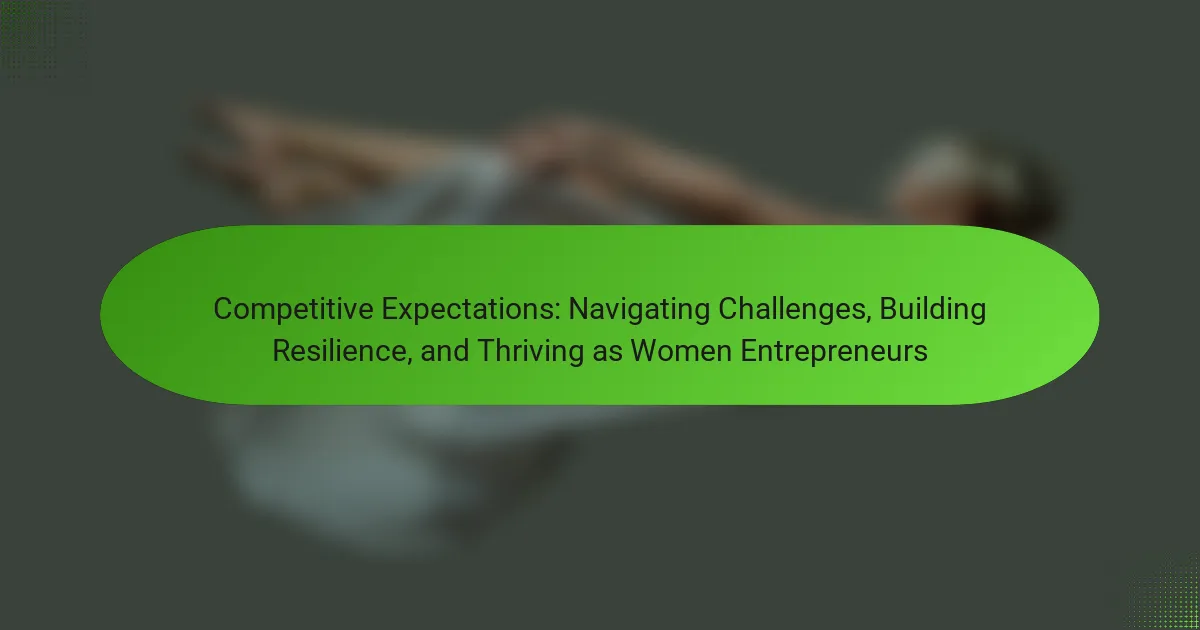Overcoming Imposter Syndrome is crucial for women in business to build confidence and advance their careers. This article explores strategies to acknowledge and challenge negative thoughts, seek mentorship and support, celebrate achievements, and practice self-compassion. Additionally, it addresses the unique challenges women face, such as societal pressures and self-doubt, and provides practical steps for immediate confidence-building. By implementing these approaches, women can foster resilience and thrive in professional environments.

What is Imposter Syndrome and How Does it Affect Women in Business?
Imposter Syndrome is a psychological pattern where individuals doubt their accomplishments. It significantly affects women in business, leading to decreased confidence and career progression. To overcome Imposter Syndrome and build confidence, women can adopt several strategies.
Firstly, acknowledge and challenge negative thoughts. Recognizing self-doubt allows women to reframe their mindset. Secondly, seek mentorship and support. Engaging with mentors can provide guidance and validation. Thirdly, celebrate achievements, no matter how small. Documenting successes reinforces self-worth. Lastly, practice self-compassion. Understanding that perfection is unattainable helps mitigate feelings of inadequacy.
Implementing these strategies fosters resilience and promotes a healthier self-image, empowering women to thrive in business environments.
What are the common signs of Imposter Syndrome?
Common signs of Imposter Syndrome include persistent self-doubt, attributing success to luck, fear of being exposed as a fraud, and discounting achievements. Women in business often experience these feelings, which can hinder confidence and professional growth. Recognizing these signs is crucial for overcoming Imposter Syndrome and building self-assurance.
How does Imposter Syndrome manifest in professional settings?
Imposter Syndrome in professional settings often appears as self-doubt and feelings of inadequacy. Women may experience heightened anxiety about their abilities, fearing exposure as a fraud despite evidence of their competence. This can manifest in reluctance to pursue promotions or share ideas, diminishing their visibility and influence. Research shows that up to 70% of people encounter these feelings at some point, impacting career growth and personal satisfaction. Addressing these feelings through mentorship and positive reinforcement can significantly enhance confidence and performance in business environments.

What are the universal causes of Imposter Syndrome among women?
Imposter Syndrome among women often stems from societal pressures, self-doubt, and perfectionism. These factors create a pervasive sense of inadequacy despite achievements. Women frequently internalize success as luck rather than skill, leading to feelings of fraudulence. Addressing these root causes involves fostering self-compassion and recognizing personal accomplishments. Building a supportive network can also mitigate these feelings and enhance confidence in professional environments.
How do societal expectations contribute to feelings of inadequacy?
Societal expectations can intensify feelings of inadequacy by imposing unrealistic standards on women in business. These pressures often stem from traditional gender roles and stereotypes, creating a pervasive sense of self-doubt. Women may feel they must constantly prove their worth, leading to imposter syndrome. As a result, many struggle with confidence, which can hinder their professional growth and success. Addressing these societal influences is crucial for building resilience and fostering a supportive environment for women in business.
What role does self-doubt play in perpetuating Imposter Syndrome?
Self-doubt significantly contributes to the persistence of Imposter Syndrome. It fosters negative self-perception, leading women in business to underestimate their skills and achievements. This cycle reinforces feelings of inadequacy, making it difficult to embrace success. As a result, addressing self-doubt is crucial for overcoming Imposter Syndrome and building confidence. Recognizing accomplishments and seeking support can help break this cycle, empowering women to assert their capabilities.

What unique challenges do women face in overcoming Imposter Syndrome?
Women face unique challenges in overcoming Imposter Syndrome, including societal expectations and self-doubt. Cultural pressures often lead women to underestimate their achievements, feeling they must prove themselves constantly. Additionally, the lack of representation in leadership roles can exacerbate feelings of isolation and inadequacy. Research shows that women are more likely to experience Imposter Syndrome due to these external factors, which can hinder their professional growth. Addressing these challenges requires targeted strategies, such as mentorship and supportive networks, to build confidence and resilience.
How does the lack of representation impact confidence levels?
The lack of representation can significantly diminish confidence levels among women in business. When women do not see themselves reflected in leadership roles, it reinforces feelings of inadequacy and self-doubt. Studies show that representation boosts self-efficacy, making individuals more likely to pursue leadership opportunities. As a result, enhancing visibility of successful women in business can foster a supportive environment, encouraging others to believe in their capabilities and strive for success.
What barriers exist in male-dominated industries?
Barriers in male-dominated industries include stereotypes, lack of mentorship, and limited access to networks. These factors can hinder women’s confidence and career advancement. Stereotypes often portray women as less competent, impacting their self-perception. The absence of female role models reduces opportunities for guidance. Limited networks restrict access to valuable resources and connections. Addressing these barriers is essential for fostering a more inclusive environment and empowering women in business.

What are some rare but impactful strategies for building confidence?
To build confidence and overcome imposter syndrome, consider these rare yet impactful strategies. Cultivating a growth mindset allows you to view failures as learning opportunities. Engaging in public speaking enhances your presence and self-assurance. Seeking mentorship provides guidance and validation, while practicing self-compassion fosters a healthier self-image. Additionally, setting achievable goals creates a sense of accomplishment, reinforcing your confidence.
How can mentorship help combat Imposter Syndrome?
Mentorship can significantly reduce Imposter Syndrome by providing guidance and validation. Mentors offer support, share experiences, and help mentees recognize their strengths. This relationship fosters a sense of belonging and confidence. Studies show that women with mentors report higher self-esteem and lower feelings of fraudulence. By receiving constructive feedback, mentees can reframe their self-perceptions and develop a more accurate understanding of their capabilities.
What qualities should you look for in a mentor?
Look for qualities such as experience, empathy, and effective communication in a mentor. A mentor should possess industry knowledge and a willingness to share insights. They should challenge you while providing support, fostering your growth and confidence. A unique attribute is their ability to relate personal experiences of overcoming challenges, which can inspire resilience.
What role does networking play in boosting self-esteem?
Networking significantly boosts self-esteem by fostering connections and validation. Engaging with peers provides support, encouragement, and shared experiences that counter feelings of inadequacy. As a result, women in business can cultivate confidence through these relationships, enhancing their professional identity. Networking also opens opportunities for mentorship, which can further reinforce self-worth and capabilities.

How can women effectively manage Imposter Syndrome in their careers?
Women can effectively manage Imposter Syndrome by employing strategies that build confidence and validate their achievements. Recognizing and challenging negative self-talk is crucial. Acknowledging accomplishments and seeking feedback from peers can reinforce self-worth.
Establishing a support network is essential; connecting with mentors and like-minded individuals provides encouragement and perspective. Setting realistic goals and celebrating small wins can foster a sense of progress and capability.
Engaging in professional development enhances skills and knowledge, further combating feelings of inadequacy. Practicing self-compassion allows women to accept imperfections and view challenges as opportunities for growth.
By implementing these strategies, women can cultivate resilience against Imposter Syndrome and thrive in their careers.
What practical steps can be taken to challenge negative self-talk?
To challenge negative self-talk, practice self-compassion, reframe thoughts, and seek supportive feedback. Start by recognizing negative patterns and replacing them with positive affirmations. Regular journaling can help track progress and reinforce a growth mindset. Engaging in mindfulness exercises reduces anxiety and enhances self-awareness, leading to improved confidence.
How can journaling help in reframing thoughts?
Journaling can effectively reframe thoughts by providing clarity and perspective. It allows women in business to identify negative self-talk and replace it with empowering affirmations. Regularly documenting experiences fosters self-awareness, helping to challenge imposter syndrome. Studies show that expressive writing can reduce anxiety and improve confidence levels. By reflecting on successes and lessons learned, journaling serves as a tool for personal growth and resilience.
What techniques can help in setting realistic goals?
To set realistic goals, use techniques such as SMART criteria, visualization, and incremental steps. SMART goals are specific, measurable, achievable, relevant, and time-bound, ensuring clarity and focus. Visualization helps in mentally mapping out success, enhancing motivation. Incremental steps break larger goals into manageable tasks, making progress more attainable.

What are the best practices for fostering a supportive workplace environment?
To foster a supportive workplace environment, prioritize open communication, inclusivity, and recognition. Encourage regular feedback and create safe spaces for discussions. Implement mentorship programs to empower women, addressing imposter syndrome directly. Promote work-life balance, allowing flexibility for personal needs. Celebrate achievements to build confidence and reinforce a positive culture.
How can organizations implement policies that empower women?
Organizations can implement policies that empower women by fostering an inclusive culture, providing mentorship programs, and ensuring equitable pay. These strategies build confidence and combat imposter syndrome.
1. Foster an inclusive culture: Encourage open dialogue about gender equality and create safe spaces for women to share experiences.
2. Provide mentorship programs: Pair women with mentors to guide career development and enhance their professional networks.
3. Ensure equitable pay: Conduct regular pay audits to identify and address wage disparities, promoting financial fairness.
4. Offer training and development: Invest in leadership training specifically for women to build skills and confidence.
5. Establish flexible work arrangements: Support work-life balance through flexible hours and remote work options, accommodating diverse needs.
What role does leadership play in promoting confidence among women?
Leadership plays a crucial role in fostering confidence among women in business. Effective leaders create supportive environments that encourage open communication and collaboration. They model vulnerability, share their own experiences with imposter syndrome, and provide mentorship, which helps women recognize their value. Research shows that women with strong role models are more likely to pursue leadership positions and exhibit higher self-esteem. By prioritizing diversity and inclusion, leaders can empower women to overcome challenges and thrive in their careers.

What common mistakes should women avoid when addressing Imposter Syndrome?
Women should avoid self-doubt, perfectionism, isolation, and comparing themselves to others when addressing Imposter Syndrome. These common mistakes can hinder confidence and professional growth.
Self-doubt often leads to underestimating abilities, while perfectionism creates unrealistic standards. Isolation prevents networking and support, and comparing oneself to others fosters negative self-perception. Recognizing these pitfalls is essential for building resilience and self-assurance in business.
By focusing on personal achievements and seeking mentorship, women can combat these tendencies and enhance their confidence.
How can over-committing lead to increased feelings of inadequacy?
Over-committing can lead to increased feelings of inadequacy by creating unrealistic expectations. When women in business take on too many responsibilities, they may struggle to meet all obligations. This struggle can foster self-doubt, as they compare their perceived failures to others’ successes. As a result, the cycle of imposter syndrome intensifies, undermining their confidence. Prioritizing tasks and setting boundaries can help mitigate these feelings and promote a healthier work-life balance.
What is the impact of comparing oneself to others?
Comparing oneself to others can lead to decreased self-esteem and increased feelings of inadequacy. This impact is particularly pronounced in women in business, where societal pressures often amplify these comparisons. Research shows that individuals who frequently engage in social comparison are more likely to experience imposter syndrome, feeling unworthy of their achievements. To overcome this, focus on personal growth and set individual goals rather than measuring success against peers. Emphasizing unique attributes and personal strengths fosters confidence and mitigates the negative effects of comparison.

What actionable tips can women apply immediately to build confidence?
To build confidence immediately, women can adopt practical strategies such as setting achievable goals, practicing self-affirmation, and seeking mentorship. These actions empower women in business to combat imposter syndrome effectively.
1. Set achievable goals: Break tasks into smaller, manageable objectives to foster a sense of accomplishment.
2. Practice self-affirmation: Regularly remind yourself of your skills and successes to reinforce a positive self-image.
3. Seek mentorship: Connect with experienced professionals who can provide guidance and encouragement.
4. Embrace failure: View setbacks as learning opportunities rather than reflections of your abilities.
5. Network effectively: Engage with peers to share experiences and build a supportive community.
6. Continuously learn: Invest in personal and professional development to enhance skills and confidence.
How can celebrating small wins contribute to overall confidence?
Celebrating small wins significantly boosts overall confidence by reinforcing a sense of achievement. Each small victory acts as a building block, creating a positive feedback loop that enhances self-esteem. Acknowledging these moments helps combat imposter syndrome, allowing women in business to recognize their capabilities. As a result, this practice cultivates resilience and encourages further progress in their professional journey.
What are effective ways to seek and accept constructive feedback?
Seeking and accepting constructive feedback involves active listening and openness to growth. Start by requesting specific feedback from trusted colleagues or mentors. Create a safe environment for honest dialogue by showing appreciation for their insights. Reflect on the feedback without becoming defensive; focus on actionable points. Regularly seek feedback to normalize the process and enhance your confidence in receiving it. Embracing this practice builds resilience and fosters professional development.
How can visualization techniques be used to overcome self-doubt?
Visualization techniques can effectively combat self-doubt by creating mental images of success. These techniques help women in business envision their capabilities and achievements, fostering confidence. By regularly practicing visualization, individuals can reinforce positive self-perceptions and reduce feelings of inadequacy associated with imposter syndrome. Engaging in this practice enhances motivation and prepares the mind for real-life challenges, ultimately leading to improved performance and self-assurance.



